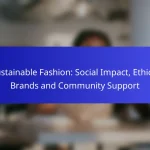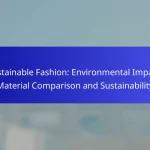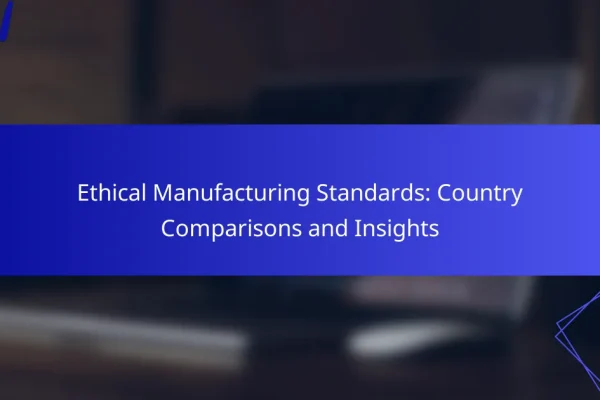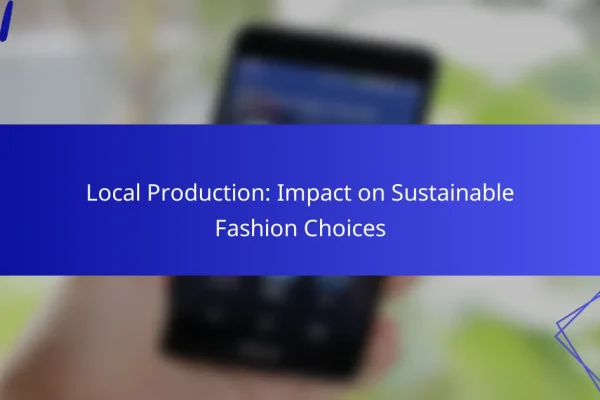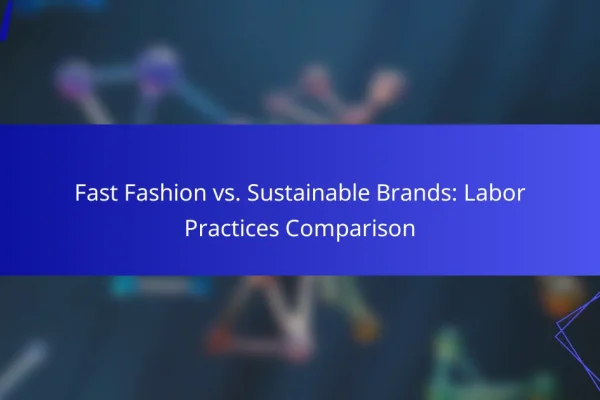How can ethical manufacturing improve fashion sustainability?
Ethical manufacturing enhances fashion sustainability by minimizing environmental harm, ensuring fair labor practices, and boosting brand credibility. This approach not only addresses ecological concerns but also fosters a more equitable industry, appealing to conscious consumers.
Reduces environmental impact
Ethical manufacturing significantly lowers the environmental footprint of fashion production. Techniques such as using organic materials, reducing water consumption, and implementing waste management practices contribute to a more sustainable process.
For instance, brands that adopt closed-loop systems can recycle materials, reducing the need for virgin resources. This can lead to a decrease in carbon emissions and pollution, aligning with global sustainability goals.
Promotes fair labor practices
By prioritizing ethical manufacturing, brands can ensure fair labor practices throughout their supply chains. This includes providing safe working conditions, fair wages, and reasonable working hours for employees.
Brands that adhere to standards such as Fair Trade or the Ethical Trading Initiative often see improved worker satisfaction and retention, which can enhance productivity and reduce turnover costs.
Enhances brand reputation
Companies that commit to ethical manufacturing often enjoy a stronger brand reputation among consumers. Transparency in sourcing and production processes builds trust and loyalty, particularly among environmentally and socially conscious shoppers.
For example, brands that openly share their sustainability initiatives and labor practices can differentiate themselves in a crowded market, potentially leading to increased sales and customer engagement.
What are the best practices for ethical manufacturing in fashion?
The best practices for ethical manufacturing in fashion focus on sustainability, transparency, and fair labor conditions. Implementing these practices not only benefits the environment but also ensures fair treatment of workers throughout the supply chain.
Use of sustainable materials
Using sustainable materials is a cornerstone of ethical manufacturing. This includes organic cotton, recycled polyester, and other eco-friendly fabrics that minimize environmental impact. Brands should aim to source materials that reduce water usage and chemical pollution.
When selecting materials, consider certifications like Global Organic Textile Standard (GOTS) or OEKO-TEX, which indicate adherence to environmental and safety standards. Opting for local materials can also reduce carbon footprints associated with transportation.
Transparent supply chains
Transparency in supply chains is essential for ethical manufacturing. Brands should disclose their sourcing practices, including where and how materials are produced. This openness builds consumer trust and encourages accountability among suppliers.
To enhance transparency, companies can utilize blockchain technology to track products from origin to retail. Regular audits and third-party certifications can further verify compliance with ethical standards.
Fair wages for workers
Ensuring fair wages for workers is critical in ethical fashion manufacturing. Brands should pay at least the local living wage, which varies by region, rather than just the minimum wage. This supports workers’ livelihoods and contributes to community well-being.
To implement fair wage practices, companies can conduct wage assessments and engage with local labor organizations. Regularly reviewing wage structures and providing benefits can help maintain fair compensation and improve worker satisfaction.
Which brands exemplify ethical manufacturing in fashion?
Several brands stand out for their commitment to ethical manufacturing in fashion, focusing on sustainable practices, fair labor conditions, and environmental responsibility. Patagonia, Eileen Fisher, and Reformation are prime examples, each implementing unique strategies to promote ethical standards in their production processes.
Patagonia
Patagonia is renowned for its dedication to environmental sustainability and ethical labor practices. The company uses organic cotton, recycled materials, and promotes fair trade practices in its supply chain. Their “Worn Wear” program encourages customers to repair and recycle their clothing, reducing waste and extending the life of garments.
Moreover, Patagonia donates a portion of its profits to environmental causes, reinforcing its commitment to social responsibility. This approach not only enhances brand loyalty but also sets a benchmark for other companies in the industry.
Eileen Fisher
Eileen Fisher focuses on creating timeless clothing while prioritizing sustainability and ethical manufacturing. The brand emphasizes the use of organic and renewable fibers, and it actively works to reduce waste through its take-back program, which encourages customers to return used garments for recycling or resale.
Additionally, Eileen Fisher is committed to fair labor practices, ensuring that workers in its supply chain are treated with respect and compensated fairly. This holistic approach to fashion not only appeals to conscious consumers but also promotes a more sustainable industry standard.
Reformation
Reformation is a leader in the sustainable fashion movement, known for its stylish, eco-friendly clothing. The brand uses sustainable materials and practices transparency in its manufacturing processes, providing customers with information about the environmental impact of each item.
Reformation also focuses on reducing its carbon footprint and water usage, striving to create a positive impact on the planet. Their commitment to ethical manufacturing resonates with consumers who prioritize both fashion and sustainability, making them a popular choice among environmentally-conscious shoppers.
How do consumers benefit from choosing ethically manufactured fashion?
Consumers benefit from choosing ethically manufactured fashion by supporting sustainable practices and ensuring fair treatment of workers. This choice often leads to higher quality products and a positive impact on the environment and local communities.
Supports local economies
Ethically manufactured fashion often relies on local artisans and small businesses, which helps to stimulate local economies. By purchasing these products, consumers contribute to job creation and the preservation of traditional crafts.
Supporting local economies can also lead to more unique and culturally rich products. For instance, buying clothing made from locally sourced materials not only reduces carbon footprints but also fosters a sense of community pride.
Encourages responsible consumerism
Choosing ethically manufactured fashion promotes responsible consumerism by encouraging individuals to consider the social and environmental impacts of their purchases. This mindset shifts focus from fast fashion to sustainable choices that prioritize quality over quantity.
Consumers can adopt responsible practices by researching brands that adhere to ethical standards, such as fair labor practices and environmentally friendly materials. Simple steps include checking for certifications or labels that indicate a commitment to ethical manufacturing.
What certifications indicate ethical manufacturing in fashion?
Certifications for ethical manufacturing in fashion help consumers identify brands that adhere to responsible practices. Key certifications include Fair Trade Certified and Global Organic Textile Standard (GOTS), each with specific criteria that ensure ethical treatment of workers and sustainable production methods.
Fair Trade Certified
Fair Trade Certified products meet strict standards that promote fair wages, safe working conditions, and community development. This certification ensures that producers receive a fair price for their goods, which helps to improve their livelihoods and support sustainable practices.
Brands that carry the Fair Trade Certified label often invest in social and environmental initiatives, such as education and healthcare for workers. When shopping, look for this certification to support ethical labor practices and sustainable development.
Global Organic Textile Standard (GOTS)
The Global Organic Textile Standard (GOTS) is a leading textile processing standard for organic fibers, ensuring that textiles are made from at least 70% organic materials. GOTS certification covers the entire supply chain, from harvesting to manufacturing, and includes environmental and social criteria.
GOTS-certified products must meet strict regulations regarding chemical use, waste management, and worker rights. When choosing clothing, look for the GOTS label to ensure that your purchase supports organic farming and ethical labor practices.
What challenges do brands face in ethical manufacturing?
Brands encounter several significant challenges in ethical manufacturing, primarily related to costs and supply chain management. These obstacles can hinder their ability to implement sustainable practices while remaining competitive in the market.
Higher production costs
Ethical manufacturing often involves higher production costs due to the use of sustainable materials and fair labor practices. Brands may pay a premium for organic fabrics or ensure that workers receive fair wages, which can increase overall expenses.
For instance, sourcing organic cotton may cost brands 20-30% more than conventional cotton. This price difference can impact retail pricing, making it essential for brands to balance ethical commitments with consumer affordability.
Supply chain complexities
Managing a supply chain that adheres to ethical standards can be complex and challenging. Brands must ensure that every step of the production process, from raw material sourcing to final assembly, meets ethical guidelines.
This often requires extensive auditing and monitoring of suppliers, which can be resource-intensive. Brands may need to invest in technology or partnerships to track compliance effectively, adding another layer of complexity to their operations.
How can consumers identify ethical fashion brands?
Consumers can identify ethical fashion brands by looking for transparency in sourcing, fair labor practices, and sustainable materials. Key indicators include certifications, clear supply chain information, and commitment to environmental and social responsibility.
Look for certifications
Certifications such as Fair Trade, GOTS (Global Organic Textile Standard), and OEKO-TEX can signal that a brand adheres to ethical manufacturing practices. These labels often require compliance with strict environmental and labor standards, providing consumers with a level of assurance about the brand’s commitment to ethics.
When shopping, check for these certifications on product labels or the brand’s website. A brand displaying multiple certifications may indicate a stronger commitment to ethical practices.
Research the brand’s supply chain
Understanding a brand’s supply chain is crucial in identifying ethical fashion. Brands that are transparent about where and how their products are made are more likely to uphold ethical standards. Look for information on their website regarding sourcing, manufacturing processes, and labor conditions.
Consider reaching out to brands directly for clarification if this information is not readily available. Ethical brands often welcome inquiries and provide detailed responses about their practices.
Evaluate sustainability practices
Sustainable practices in fashion include the use of eco-friendly materials, waste reduction, and energy-efficient production methods. Brands that prioritize sustainability often highlight their efforts in marketing materials, so look for mentions of organic cotton, recycled materials, or water-saving techniques.
Additionally, consider the longevity of the products. Brands that focus on quality over quantity tend to promote sustainable consumption by encouraging customers to buy less and invest in durable pieces.





